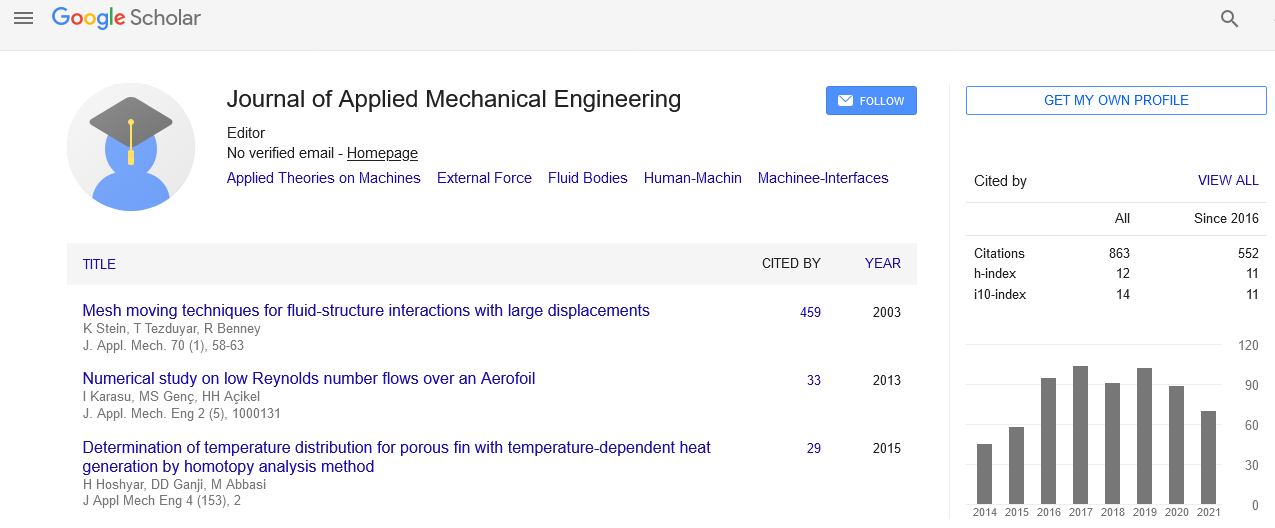Indexed In
- Genamics JournalSeek
- JournalTOCs
- CiteFactor
- RefSeek
- Hamdard University
- EBSCO A-Z
- OCLC- WorldCat
- Publons
- Google Scholar
Useful Links
Share This Page
Journal Flyer

Open Access Journals
- Agri and Aquaculture
- Biochemistry
- Bioinformatics & Systems Biology
- Business & Management
- Chemistry
- Clinical Sciences
- Engineering
- Food & Nutrition
- General Science
- Genetics & Molecular Biology
- Immunology & Microbiology
- Medical Sciences
- Neuroscience & Psychology
- Nursing & Health Care
- Pharmaceutical Sciences
Performance improvement of simple and combined cycle power plants by gas turbine inlet air conditioning using absorption cooling system
4th International Conference and Exhibition on Mechanical & Aerospace Engineering
October 03-04, 2016 Orlando, USA
Mohamed Elberry, Abdel-Rahman A A, Elsafty A F, Elsayed A A and Teamah M A
Alexandria University, Egypt
Scientific Tracks Abstracts: J Appl Mech Eng
Abstract:
Simple and combined cycle gas turbines are involved in the production of 50% of the total electricity generated in Egypt. Despite their numerous advantages, they are nevertheless negatively impacted by ambient temperature: On hot days power demand increases while gas turbine power falls. A significant decrease in the generation efficiency occurs at high ambient temperature due to lower air density and the resulting increase in compressor specific work. Achieving substantial saving in produced electricity by adding an inlet air cooling system to gas turbine has become an approved and well recognized technology. In the present paper, an integration of a (Lithium Bromideā??Water) absorption inlet air cooling scheme to a cooled gas turbine-based combined cycle was analyzed. The waste heat energy of the exhaust gas prior to the exit of the waste heat recovery steam generator was chosen to power the cooling system. Nubaria Power Station, 120km South East of Alexandria has been selected as a reference plant for the present study. It includes 3 generation modules, each including 2*264 MW GT and 250 MW ST. A thermodynamic model of the overall integrated scheme of the cooling and power cycles is introduced. A parametric study of the effect of different operational conditions, namely; ambient temperature, relative humidity, compressor inlet air temperature, and part load on performance parameters was carried out. The model shows an increase of 11% in the produced electricity when the inlet air was cooled from 30Ā°C to 10Ā°C, Also, harvesting of condensed fresh water at a rate of 3.5gm per kg of inlet air at ambient relative humidity of 60%. The model results have been verified by observing the real performance of the plant at various ambient conditions and by comparison with ABSIM software results at similar working assumptions.
Biography :
Mohamed Elberry is a PhD candidate in the Mechanical Engineering Department, Alexandria University. He is a Certified Energy Manager for the American Society of Energy Engineers. He is also a Green House Gases Lead Verifier. With 20 years of experience, he has assumed many technical and managerial positions in the Oil and Gas Sector in Egypt and Middle East. His last official job title was Director-QHSE in Air Liquide Egypt. Currently, he occupies the position of Managing Director of a small size training and consultancy office. He has been recently nominated as the first responsible care national expert by the Federation of Egyptian Industries.

